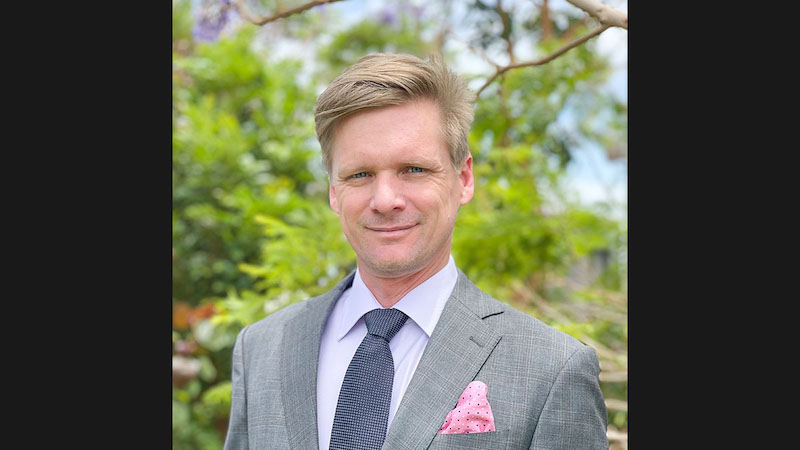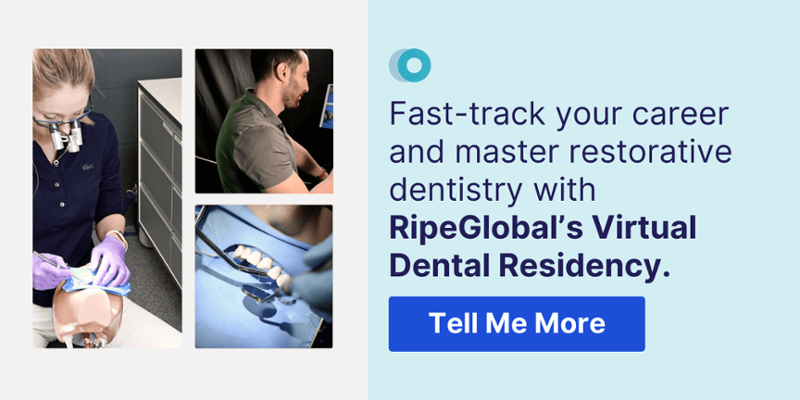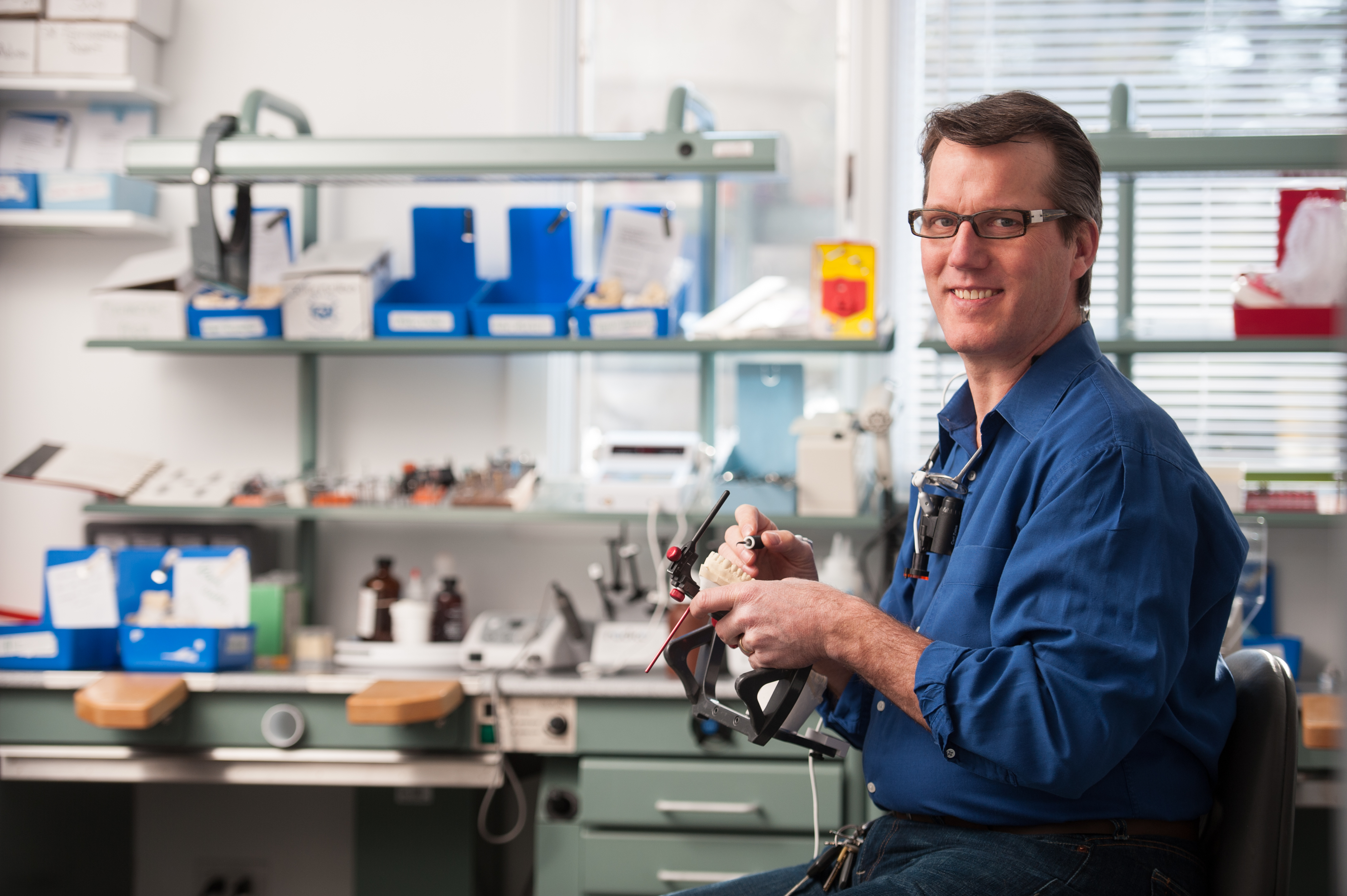Pitfalls and the Trinity of skills
After many intense university years, you graduate and now you’re a dentist! Your restorations are coming along and by all accounts, you’re settling into your new career.
In your downtime, you scroll through gorgeous and complex cases uploaded onto RipeGlobal’s Facebook page by master dentists like Dr Lincoln Harris. You might reflect on how far you have yet to go in your skills acquisition before you can produce fine-looking work like Dr Linc's.
Dr Linc shares some of the insights he learned from more than 2 decades of practising dentistry.
Attitude counts more than experience
It is impossible to get 15 years of experience without having 15 years of experience.
If you want to be a dentist whose work looks like it is filled with 15 years of experience, the earlier you start that 15 years of experience the better.
With age, you make better judgments, but there is no shortcut to having a solid amount of time and a number of repetitions to reach a certain level of skill.
If you think that you should wait until you are older before you strive to learn more complex dentistry... it's like saying that the best time to start learning tennis is when you are 40 because you will have better judgement. We all know that the best time to start learning tennis is when you are five. For some reason in dentistry, there is the thought that you should start learning complex dentistry when you are older, and it is not actually true.
You don’t know as much as you think
This might sound counterintuitive but the first step you should take toward learning more complex dentistry is to recognise that you didn’t know as much as you thought. It’s easier to recognise now with social media but when I graduated you didn’t know what was possible.
Just start
Just start your education because no education is going to make you excellent at full mouth rehabilitation. The problem is you often think, ‘I can’t do it therefore there’s no point in learning it,’ so you basically assume that if you can’t do it before you’re educated then you won’t be able to do it after you’re educated - which is a strange idea because it is the education that allows you to do it. You can’t do it before you’re educated but it can seem too intimidating to start.
Stand on a mountaintop and look across a valley to another mountain top and it looks just so far to reach, but if you don’t start walking it is too far. When you do start walking you’ll end up at some point halfway across the valley and reaching the other mountain will seem possible. You won’t be very good when you start and you make a lot of failures and errors.
You can’t educate away failure
Every single person who has learned full mouth rehabilitation has had significant complications in their past case experiences. It’s impossible to educate that away.
Often people want to educate away the risk of failure but it’s not possible. You can not do so much education that you will not fail.
Holy trinity skills
1. Restorative Treatment Planning
2. Orthodontics
3. Implantology/periodontics
The basis of all multidisciplinary dentistry is restorative treatment planning. Build on the foundation of restorative.
Then it’s a good idea to add in some training in orthodontics and implantology, even if you are not going to do them, because that forms the holy triangle of rehabilitations: restorative, perio/implants, and orthodontics.
In my journey I learned restorative treatment for full mouth rehabilitations, then orthodontics and implantology.
Along the way you have to start doing rehabilitations even though you're not hugely experienced and they are scary. They are more forgiving than you think. The vast majority of rehabs I did when I was very inexperienced held up very well 15 years later.
When I look at those very first cases today, it gives me a lot more confidence - which is the thing you don’t have when you start. Instead you have a lot of fear that you’re going to do this tremendously complex and expensive treatment that won’t last, then as time goes by and you see that those cases hold up quite well. Then you have significantly more confidence because you see that your work has lasted.
As long as the work is meticulous
The key part is that people focus on the concept of rehabilitation: occlusion, design, material, how you treatment plan, what preps you do. But the most important part of the journey toward full mouth rehabilitation is that each step is done with precision. How meticulous you are is more important than the big picture with each case. The big picture is good for planning, but it is precision that makes it last.
It’s impossible to learn everything in one course
Whatever course you will do, you will do more courses. When dentists graduate they have spent more of their course learning how to do fillings than any other procedure, and after 20 years, they are still doing courses on how to do fillings. But they think with full mouth rehabilitation they will do one course and they will know everything. It’s not true. Even if you did the exact same course twice it would be a different course and you will learn different things.
Here are the four pitfalls
1. Don’t fight with your patients. If they don’t love their teeth, do it again.
2. If you can’t afford to do the entire case again for free then don’t start doing it.
3. You can’t afford to rush.
4. Documentation will probably not be good enough at the start and you will learn the hard way like everybody else.
Modern technology doesn’t make it easier
It magnifies our work. If our work is good, modern technology makes it better. If our work is bad, modern technology makes it worse. If we are efficient it makes us faster. I would never go back to impressions after having had a scanner.
You don’t have to be massively experienced to start this journey. The earlier in your career you start this journey the more advanced you will be by the same age. But your failures will be compressed earlier in your career.
There is no comfortable way to start. The more rapidly you learn the less comfortable it will be. If you want to be comfortable, learn extremely slowly. But your final endpoint is going to be much less. When people start early, experienced dentists will criticise them. But people who start early will push their learning curve early in their career. I know people who are fresh out of dentistry school and are actually quite good at it.
You can treatment plan everything if you can do full-mouth rehabilitation
You can solve complex problems for people who haven’t had their problems solved elsewhere.
To illustrate with a metaphor: if you can build a skyscraper you can probably build a house, but if you can build a house you can’t necessarily build a skyscraper. Just because you can build complex engineering structures doesn’t mean that everything you do is one of those, but having the ability to do that makes lesser jobs easy.
You get to do dentistry that is rewarding rather than just necessary. You get to do dentistry with a patient who says “I would like this” rather than “do I need it”.
It’s the difference between dentistry that patients desire than dentistry that they hope they don’t need.
Doing full mouth rehabilitation doesn’t make you wealthier but people who do full mouth rehabilitations tend to be more passionate about their careers compared to dentists whose practice is high volume basic care. Such dentists generally don’t like their jobs; rather, they do their jobs so they can enjoy their weekends.
Stress levels are the same
You’re doing complex care with a big case. With small jobs you have to stay on time for five times as many cases.





